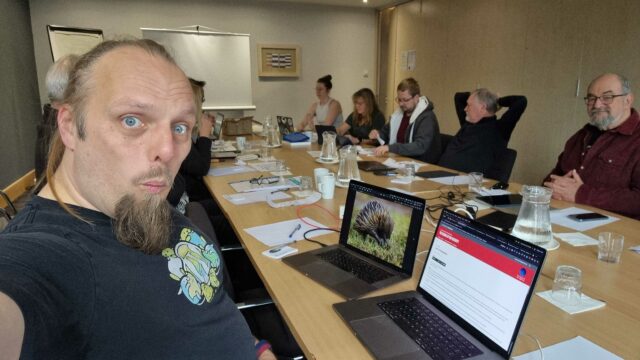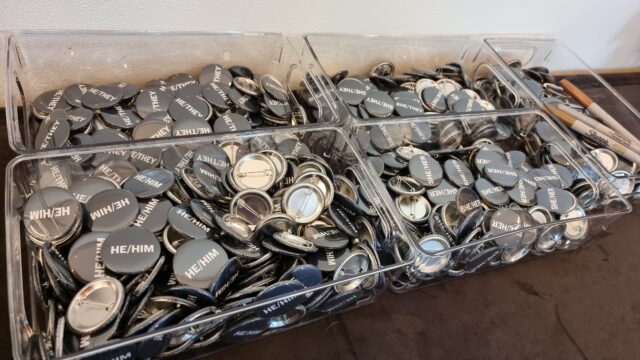A couple of weeks ago, I kicked off my first sabbatical since starting at Automattic a little over five years ago1.

The first fortnight of my sabbatical has consisted of:
- Three Rings CIC’s AGM weekend and lots of planning for the future of the organisation and how we make it a better place to volunteer, and better value for our charity users,
- building a first draft of Three Rings’ new server architecture, which turns out to mostly work but still needs some energy thrown at it,
- a geohashing expedition with the dog, and
- a family holiday to Catalonia, Spain.

The trip to Spain followed a model for European family breaks that we first tried in Paris last year2, but was extended to give us a feel for more of the region than a simple city break would. Ultimately, we ended up in three separate locations:
- Barcelona, where we stayed in a wonderful skyscraper hotel with fantastic breakfasts and, after I was able to get enough sleep, explored the obvious touristy bits of the city (e.g. la Sagrada Família3 and other Gaudían architecture, the chocolate museum, the fort at Montjuic, and because it’s me, of course, a widely varied handful of geocaches).
- The PortAventura World theme park, whose accommodation was certainly a gear shift after the 5-star hotel we’d come from4 but whose rides kept us and the kids delighted for a couple of days (Shambhala was a particular hit with the eldest kid and me).
- A villa in el Vilosell – a village of only 190 people – at which the kids mostly played in the outdoor pool (despite the sometimes pouring rain) but we did get the chance to explore the local area a little. Also, of course, some geocaching: some local caches are 1-2 years old and yet had so few finds that I was able to be only the tenth or even just the third person to sign the logbooks!

I’d known – planned – that my sabbatical would involve a little travel. But it wasn’t until we began to approach the end of this holiday that I noticed a difference that a holiday on sabbatical introduces, compared to any other holiday I’ve taken during my adult life…
Perhaps because of the roles I’ve been appointed to – or maybe as a result of my personality – I’ve typically found that my enjoyment of the last day or two of a week-long trip are marred somewhat by intrusive thoughts of the work week to follow.

If I’m back to my normal day job on Monday, then by Saturday I’m already thinking about what I’ll need to be working on (in my case, it’s usually whatever I left unfinished right before I left), contemplating logging-in to work to check my email or Slack, and so on5.
But this weekend, that wasn’t even an option. I’ve consciously and deliberately cut myself off from my usual channels of work communication, and I’ve been very disciplined about not turning any of them back on. And even if I did… my team aren’t expecting me to sign into work for about another 11 weeks anyway!

Monday and Tuesday are going to mostly be split between looking after the children, and voluntary work for Three Rings (gotta fix that new server architecture!). Probably. Wednesday? Who knows.
That’s my first taste of the magic of a sabbatical, I think. The observation that it’s possible to unplug from my work life and, y’know, not start thinking about it right away again.
Maybe I can use this as a vehicle to a more healthy work/life balance next year.
Footnotes
1 A sabbatical is a perk offered to Automatticians giving them three months off (with full pay and benefits) after each five years of work. Mine coincidentally came hot on the tail of my last meetup and soon after a whole lot of drama and a major shake-up, so it was a very welcome time to take a break… although of course it’s been impossible to completely detach from bits of the drama that have spilled out onto the open Web!
2 I didn’t get around to writing about Paris, but I did write about how the hotel we stayed at introduced our eldest, and by proxy re-introduced me, to Wonder Boy, ultimately leading to me building an arcade cabinet on which I finally, beat the game, 35 years after first playing it.
3 Whose construction has come on a lot since the last time I toured inside it.
4 Although alcohol helped with that.
5 I’m fully aware that this is a symptom of poor work/life balance, but I’ve got two decades of ingrained bad habits working against me now; don’t expect me to change overnight!

















